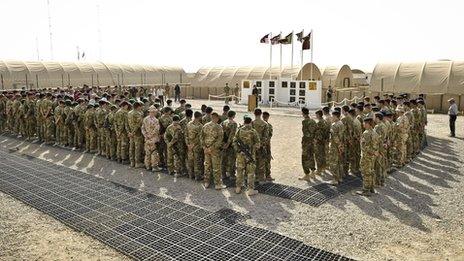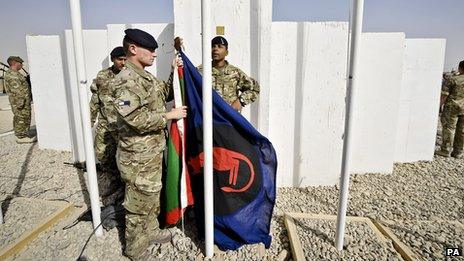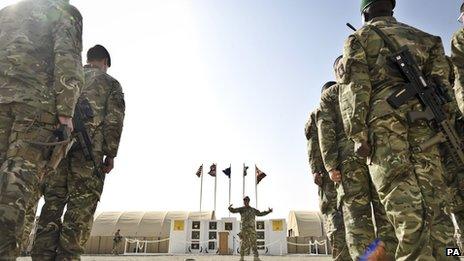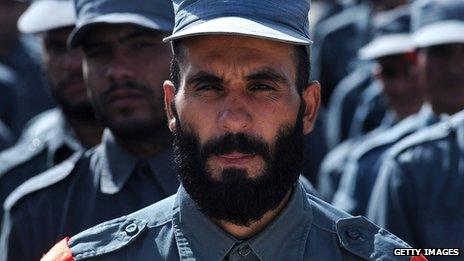Commander praises UK troops as final major Afghan deployment begins
- Published

The formal handover ceremony was at Camp Bastion
An army commander has paid tribute to British troops, as the deployment of the last major British force to Helmand in southern Afghanistan begins.
Speaking at a handover ceremony at Camp Bastion, commander Brig James Woodham praised soldiers from 1st Mechanized Brigade for "a job well done".
The 7th Armoured Brigade, the Desert Rats have now begun their mission.
They will be responsible for packing away forces' equipment ahead of the final British pullout next year.
Troops are not expected to be involved in regular fighting as Afghan forces will now take the lead.
But some will remain in the country for nine months, rather than the usual six.
Taking control
Around 100 soldiers from both incoming and outgoing brigades gathered to take part in the handover to the Germany-based Desert Rats.
After the blue flag of the Desert Rats was raised to the sound of bagpipes, incoming commander Brig Woodham said he was determined to build on 1st Mechanized Brigade's investment and bring the campaign to a successful conclusion.
"I congratulate the 1st Mechanized Brigade on a job well done and I wish them a safe and swift trip back to their families.
"For the Desert Rats - we've got a job to do," he said.

The Desert Rats flag was raised to signify the incoming of 7th Armoured Brigade

Operation Herrick 19, the latest deployment, runs until June 2014

Afghan forces and police will take full security responsibility by the end of 2014
Outgoing commander Brig Rupert Jones also praised his troops and said Afghan forces had "exceeded all expectations" while leading for the first time in a summer fighting season.
He said he was confident Afghan forces were capable of taking control as UK troops stepped back.
He also defended the role that Nato-led International Security Assistance Force (Isaf) has played in Afghanistan.
It follows comments made by President Hamid Karzai in a BBC interview which criticised the Nato exercise in Afghanistan for causing "a lot of suffering" and making "no gains".
Brig Jones said: "What I hear from local Afghan commanders and governance leaders is that they recognise the job that Isaf have done here for them - that the situation has been transformed - but importantly that they are now ready to take forward the mantle."
'Equipped'
Operation Herrick 19, the latest deployment, runs until June 2014.
A large part of the force is made up of engineers as attention turns to bringing back equipment and disposing of what cannot be returned.
Afghan forces will take the lead on all operations, but British troops have enough army and infantry for combat.
All combat operations in the country are expected to be over by the end of next year, leaving Afghan forces fully in control.
The UK presence in Afghanistan will be almost halved by the end of this year to 5,200.
British troops are now placed at five bases - down from a peak of more than 130 - and rarely go on patrol.
Six thousand soldiers and 300 armoured vehicles took part in a final training exercise, named Pashtun Dawn, ahead of the deployment.
The exercise was the largest on Salisbury Plain for 10 years.
Major Chris Hunter, a former bomb disposal officer for the British Army, told the BBC that Afghan forces should now be prepared to lead operations.
"It's down to leadership. They're certainly trained, they're certainly equipped to carry out the role," he added.